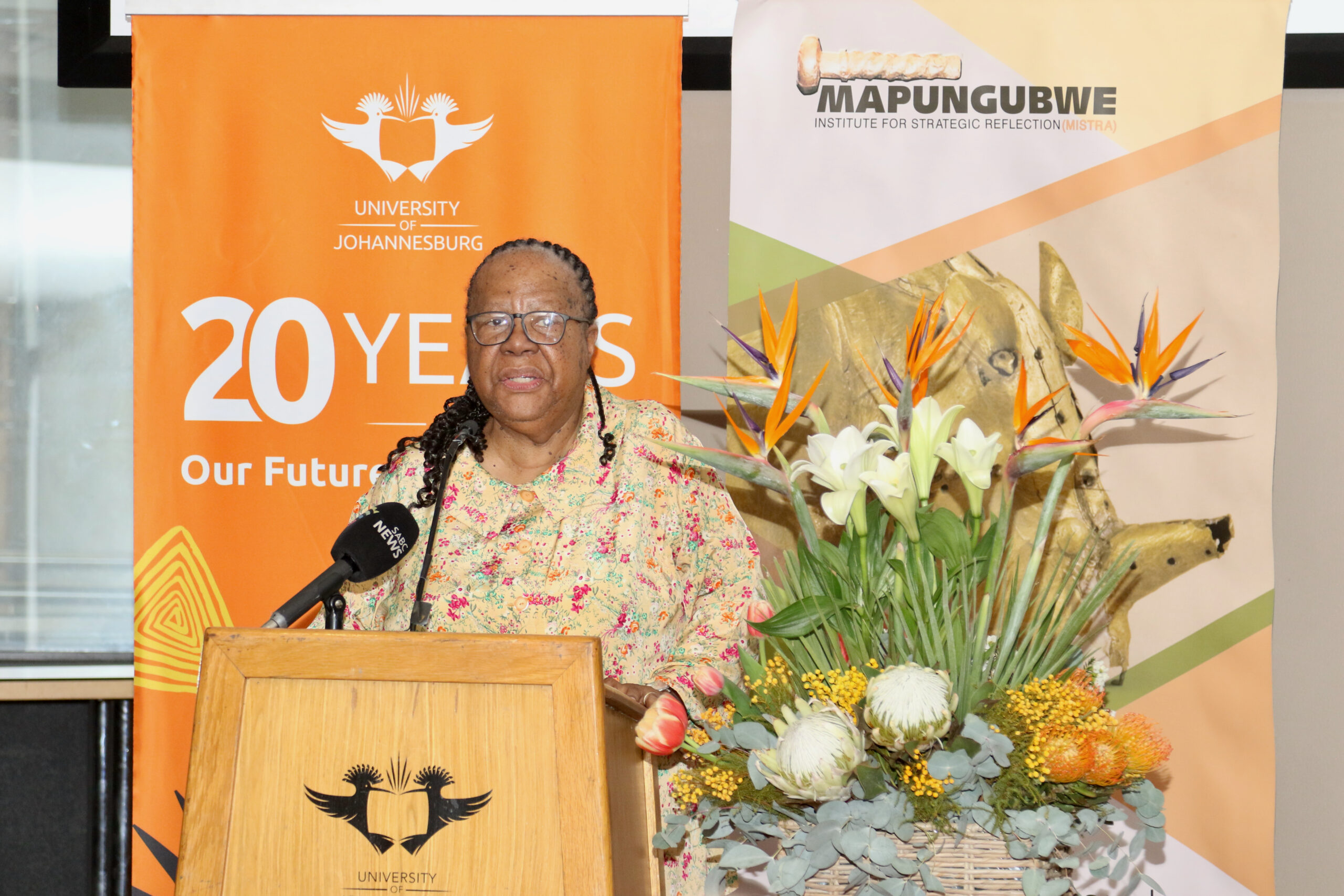Geopolitics and the current state of international relations took centre stage at the 13TH Mapungubwe Institute for Strategic Reflection (MISTRA) Annual Lecture. The lecture, organised by the organisation in partnership with the University of Johannesburg (UJ), was delivered by Dr Naledi Pandor.
Hosted at the Ubuntu Chamber on the University’s Auckland Park Kingsway Campus, Dr Pandor shared her wealth of experience with the audience, discussing under the theme, ‘Has the world moved under our feet?’
Dr Pandor, who currently serves as the chairperson of the Board of Trustees at the Nelson Mandela Foundation, used her lecture to examine current geopolitical developments in relation to US-China relations and their implications for global peace and the political economy, as well as the prognosis for US-South Africa relations.

The lecture attracted members of the diplomatic corps, ambassadors and heads of mission, academics, scholars of international relations, and thought leaders, as well as individuals interested in understanding international politics.
In her welcoming remarks, Professor Refilwe Phaswana-Mafuya, Deputy Vice-Chancellor: Research & Innovation said the MISTRA annual lecture has become an important part of the country’s discourse.
“It is my great honour to welcome you all to the annual lecture. Since its inception in 2012, this flagship lecture has become a distinguished platform in South Africa’s intellectual and policy discourse, bringing together thought leaders, to reflect deeply on complex issues facing our times. We are proud as UJ to continue working alongside MISTRA in curating these critical conversations,” she said.
Prof Phaswana-Mafuya added that Dr Pandor’s experience and work make her the ideal voice to give this year’s lecture.
“We are especially privileged to host our keynote speaker, Dr Naledi Pandor, chairperson of the Nelson Mandela Foundation, and a true stateswoman of our democracy. Dr Pandor’s lifelong contribution to Education, Home Affairs and International Relations, coupled with her intellect and principled leadership, make her an ideal voice to reflect on today’s theme,” Prof Phaswana-Mafuya said.
Dr Pandor’s lecture took the audience on a tour around the world, indicating the subtle changes that may indeed agree that the world has ‘shifted’. From the surprising re-election of Donald Trump as president of the US, to the continuing rise of China as a manufacturing giant. Her lens then shifts to India’s emergence as an economic powerhouse to the East Asian bloom of tourism, manufacturing and energy resources.
Dr Pandor then speaks on how this reflects on what were known traditionally as powerhouses, the West and Europe: “All this means that for the first time in centuries America and Europe (the West) have effective non-European competitors that understand strategic imperatives and utilise opportunities effectively. It is difficult to describe Europe’s place in this competitive context. The region continues to be a powerful global unit, but over time, it has somewhat appeared to lose currency due to a seeming deference to America.”
On Africa’s place in this global picture, Dr Pandor highlights the importance of the region growing into its potential: “What place does Africa occupy in these shifting grounds? It has significant strategic potential, and unrealised promise in lead economies such as Nigeria, South Africa, Ghana, Kenya, Egypt, Algeria, and Mauritius. Nonetheless our continent has yet to make good out of its abundant promise and to learn to do so as a strategic united economic force, rather than national states trying ineffectively to engage with giants”.
She added that Africa’s continued dependency on aid, is a stumbling to its progress.
“Tragically Africa has not succeeded fully in weaning itself of dependency on Aid, on the reality of long-term leaders that cannot shift the ground, on corruption, and poor capacity in executing development plans. Africa appears locked into existing positions while the ground is shifting. Belief that rescue exists from Europe, America or China is misplaced and greater investment in African excellence and African performance is critically urgent,” Dr Pandor said.
Ending off her talk, Dr Pandor shares her belief that the upcoming G20 summit, which South Africa holds the chair of, presents an opportunity to align these new changes that the world faces.
“The Chair-ship of G20 has created excellent opportunities for South Africa to showcase our country and the continent. The South African theme unashamedly confirms our commitment to positive values of diversity and shared prosperity. The efficient hosting of over 100 meetings has illustrated our ability to manage large events and created a fresh opportunity in this climate to strengthen links with Europe and the world’s premier emerging economies”.
“South Africa needs to use the summit to have a dedicated reflection on the globe, on international law, inclusive growth and strategies to relieve Africa of the yawning post-covid debt that is hindering Africa’s progress. If a new alliance on humane values can be built among the nineteen that may attend, the prospects for this changing world will be more positive and it will be wonderful that South Africa will have played a new leadership role in establishing a new global ethos,” she said.
In his closing remarks, MISTRA executive director Joel Netshitenzhe, lauded Dr Pandor for an informative and impactful lecture.
“I think we can all agree that there could not have been a better presenter for this theme, this year. Dr Pandor’s credentials, on the theory and praxis of International Relations, are legendary, and her integrity, in my view, is unassailable,” he said.
Watch the lecture here:



